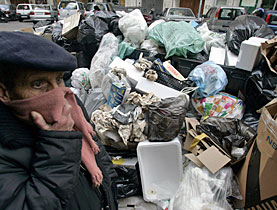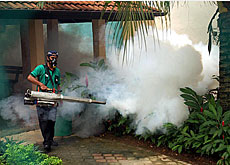Swiss keen to take on Naples rubbish

As the rubbish crisis continues in Naples, Swiss waste incineration companies are in talks with the city authorities in Italy over importing the waste.
It may take up to five years before the Naples region, with a population of six million, will be in a position to manage its waste locally.
If a deal is done with the Swiss, the cantons concerned and the federal authorities will have to grant approval before Italian rubbish can be transported for incineration.
An association of 14 incinerating plants from the German-speaking part of Switzerland is currently negotiating with Naples, according to Pierre Ammann, head of a waste industry association. A second grouping of four Swiss incineration plants is also involved in talks with Naples.
Switzerland already imports waste, mainly from Germany. One in ten bin bags that arrive at incinerators comes from outside the country. It is a profitable business, with processing costs of SFr130 ($118) per tonne of rubbish and a rate of SFr180 per tonne to take the rubbish in.
The extreme pressure the Naples authorities are under is adding urgency to the negotiations, Ammann said. If all goes according to plan, the rubbish could be transported by train to Switzerland by next month.
However, for the time being, the Federal Environment Office has received no request for permission to import rubbish from Naples.
“There are talks taking place but no import [of rubbish] has been approved. No request has been handed in to us either,” the office’s Beat Frei told swissinfo.
Environmental organisations are sceptical about importing the rubbish. A spokesman for the Swiss Transport and Environment Association, for example, told German-language national radio that it made no sense to transport mountains of rubbish to Switzerland.
Rubbish mountain
In Naples some 110,000 tonnes of rubbish has built up over the past two weeks. The Italian waste, if taken in by the Swiss, would be distributed between 15-20 sites.
From an ecological point of view the burning of the waste in Switzerland makes sense, according to Ammann. The outdoor burning that is currently being practised in Naples releases 1,000 times more dioxins than burning in one of the Swiss incinerators.
In Switzerland all combustible waste that is not recycled must be incinerated in appropriate plants. The large majority of these materials ends up in one of the country’s 28 municipal solid waste incinerators.
A permit from the authorities would need to be renewed annually. Experts estimate that it will take up to five years for the Naples authorities to open a rubbish facility to meet EU standards.
The European Commission has already begun proceedings against Italy for previous breaches of waste management regulations in Naples.
swissinfo with agencies
Switzerland burns 3.5 million tonnes of combustible waste per year.
Incineration helps to reduce pollutant emissions and preserve resources, according to the Federal Environment Office. The volume of waste is reduced by 90% and its weight by 75%.
However, the slag must be deposited in costly bioreactor or residual-waste landfills, since it contains environmentally damaging heavy metals.
Authorities in Naples started shipping some of the city’s two weeks’ worth of uncollected rubbish to other parts of Italy on Friday.
The latest crisis is one of a series of waste collection breakdowns going back almost 15 years.
It is due to the fact that the Campania region produces more rubbish than it can dispose of acceptably.
Nearby landfills are saturated and residents oppose the construction of new dumps and incinerators, which they say pose health hazards.
Government plans to open four new dumps have been blocked by angry residents and the Camorra, the Neapolitan mafia, continues to make money by controlling the illegal dumping of millions of tonnes of toxic waste.

In compliance with the JTI standards
More: SWI swissinfo.ch certified by the Journalism Trust Initiative


You can find an overview of ongoing debates with our journalists here. Please join us!
If you want to start a conversation about a topic raised in this article or want to report factual errors, email us at english@swissinfo.ch.